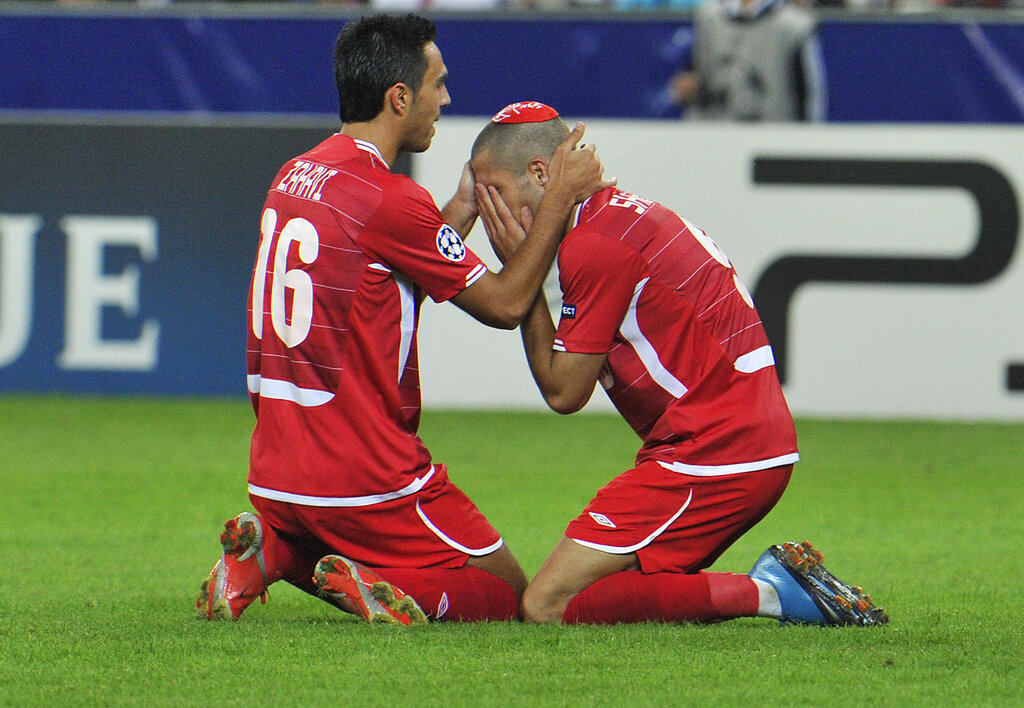In January 2007, the young team – which had qualified a few months earlier for the European Championship after knocking out Karim Benzema’s France – finally managed to find a training opponent that would agree to play against them and was hosted for a game in Achnas, a town near Larnaca, at the young Cyprus.
It was a game where almost no crowd was present, even the parents of the Cypriot players barely came. In the 25th minute, the Cypriot referee approached coach Guy Levy and asked him to replace Itay Shechter. It happened after Schachter dived for the second time in the box, and since the referee had already shown him a yellow after the first premature dive, he was not comfortable sending off a player in a friendly match, at such an early stage of the match.
So Guy Levy replaced Schechter with Shlomi Arbitman. I remember laughing out loud. Shechter has not yet turned 20, he played for Maccabi Netanya for barely half a season, but his name has already gone before him. It was not a mocking laugh, God forbid, but a laugh of pleasure. Sometimes a soccer player develops a golden trait that makes him special. Itai Schechter, who retired from the game today (Thursday) at the age of 37, will be remembered as someone who – until the VAR era, and even during it – knew how to beat referees, defensive players and the entire crowd and become the greatest penalty taker in the history of Israeli football.
And yet, it seems that this feature – which is a trump card just like a terrific shot, a crazy dribble or a powerful kick – does Schachter an injustice. Just like Gili Landau who had an impressive career but what he will be remembered for is the handball in the 1983 cup final, like Maradona whose comparisons with Pele, Messi or Cruyff are accompanied by many asterisks, Schechter’s dives/forecasts steal the real show from his career.
***
Sit a moment, look for stable ground, the data will come soon: Schechter scored 151 goals in his career, 106 goals in the Premier League, 9 goals in the European Cups, five in the national team. And yet with all this he has the label of overrated, one who reached double digits in only two seasons in his career, one who was always in the shadow of big stars and not a big star in his own right.
Itai Schechter scores in the Hapoel Tel Aviv uniform against Red Bull Salzburg, in the Champions League qualifiers, August 2010 (Photo: AP Photo/ Kerstin Johnson)
Well, there is a need to refute this diagnosis. It seems that Schachter was underrated and not the other way around. At his peak, he would dismantle defenses thanks to a quick first step, a crazy dribble, an ability to control the ball and emerge into kicking and striking situations. As the top scorer for Hapoel Tel Aviv in the double season – 28 goals in all competitions – the greatest season in the history of Hapoel Tel Aviv, and also the best team in the history of Hapoel Tel Aviv, he is considered a player for whom the question will be which team from the top 5 in Europe will take him He and Eran Zahavi were labeled as players who don’t belong in this league, not even Gilly Vermot.
The duck-like walk, the mischievous smile, the ability to be interviewed in a light manner, the childlike sincerity that was expressed even in his commentary on the TV in the 2022 World Cup, and of course the clarity, built an incorrect and certainly unfair image for Schachter. Schechter was a “super player” – as a player and as a person – who made the team he played for better, both on the field and in the locker room. Sometimes, especially towards the end of the career, it was mostly in the dressing room. Schechter is an unbeatable asset, the first one to choose when doing business in the neighborhood. He will bring with him quality, character, and things that are not written in the statistics. And he will be happy.
***
In the summer of 2004, Nachi Schechter, Itai’s father, sat down with Avi Luzon in a restaurant that operated at a gas station owned by the late Nachman Mandel, the chairman of the Maccabi Pet Association at the time. The young Schechter was then a player in the youth team of Hapoel Emek Jezreel. Luzon did the math, he had at his disposal the biggest team in the history of Maccabi Fatah, one that was going to play in Europe for the first time, and its boys team already had two stars: Omer Demari and Tal Ben Haim. With Shechter, he might have won the championship, maybe not, we don’t know.
Nachi Shechter seriously listened to a magical proposal by Avi Luzon and chose Hapoel Nazareth Elite, which was facing its debut season in the Premier League. Who chooses to play close to home at Ramat Yishai’s level and prefers it to a team that is constantly growing, in which Salim Tuama and Omer Golan and Gal Alberman play? Father Shechter chose, the son later continued on this path.
Itai Shechter played in 12 clubs, of which the 5 biggest (only Alon Mizrahi, Maor Bozaglo and Shawn Goldberg did it apart from him) and two more magnificent clubs that are today considered the second fat layer of Israeli football – Maccabi Netanya and Hapoel PT. He played in clubs that took their history A total of 79 championships, a record that only Yossi Benyon did better than, because among the many teams he played in, he played in three leagues from the Bundesliga, Swansea from the Premier League and Nantes from the French Ligue 1. And this is a rare event, which only Ben Shaher repeated him.

Itai Schechter celebrates a goal in a Swansea uniform against Wigan Athletic in the English Premier League (Photo: AP/Jon Super)
Schechter tried to maintain quality, sometimes giving up his desire to play for a hostel, status and livelihood, and he retires without playing even one season in his life in a lower league.
***
Three amusing anecdotes that are worth mentioning: In the summer of 2010, Hapoel Tel Aviv played in Salzburg in the first of two matches to advance to the group stage of the Champions League. Vincent Enyeme scored a penalty in the very first attack, the Austrians equalized, Ben Shaher scored the 1:2 minute into the half and then began the second half.
Avihai Yedin sent a deep ball, Schechter with the rare exit from the spot, was no exception, ran in front of the goalkeeper Gerhard Tramel, subdued him – and in fact guaranteed Hapoel Tel Aviv a place in the group stage – then knelt down, pulled out from under him a red cap, which he received at the airport from an elderly fan of Hapoel, put on his head and said “Hear Israel.”

Itai Schechter celebrates with Eran Zahavi after scoring a goal in the Hapoel Tel Aviv uniform in the Champions League qualifier against Red Bull Salzburg, August 2010 (Photo: P Photo/ Kerstin Johnson)
In the group stage, Hapoel Tel Aviv hosted Schalke 04 in Bloomfield. Schechter was the one who scored the clinching goal in Gelsenkirchen in a 3:1 loss, but the important task for him in the rematch was to get a shirt for Raul, the Spanish superstar, who played for the German team. At halftime, in an amazing act, he asked Schechter changed shirts, and this was done. For the second half, Schechter posted a picture of himself surrounded by dozens of prestigious shirts during his career. Schechter remained the boy from Ramat Yishai.
The last story will surprise some people, but it has been verified with most of the factors that appear in it. Itai Shechter was scheduled to start in the young team’s lineup in the game in Kon in which they faced young France for the right to qualify for the European Championship. At that time, coach Guy Levy was helped by a numerologist named Dan Farr, who checked the birth dates of the players and told Levy that Schechter’s date of birth would not match this game. Levy informed Schachter that not only would he not be in the lineup, he would not even be included in the roster. The 17-year-old Ben Shahar joined the team, who also scored, and the rest is history. Schechter, a rising star at Maccabi Netanya, was not even included in the youth team’s squad for the European Championship.
In conclusion, it is said as follows: although the anecdotes related to his career are sometimes spectacular from the goals he scored, Itai Schechter is not an anecdote in the history of Israeli football. He will be remembered as one of the most influential players of our generation, and certainly one we enjoyed and will miss.
#Itai #Schechter #remembered #influential #players #generation
2024-04-18 22:45:07







